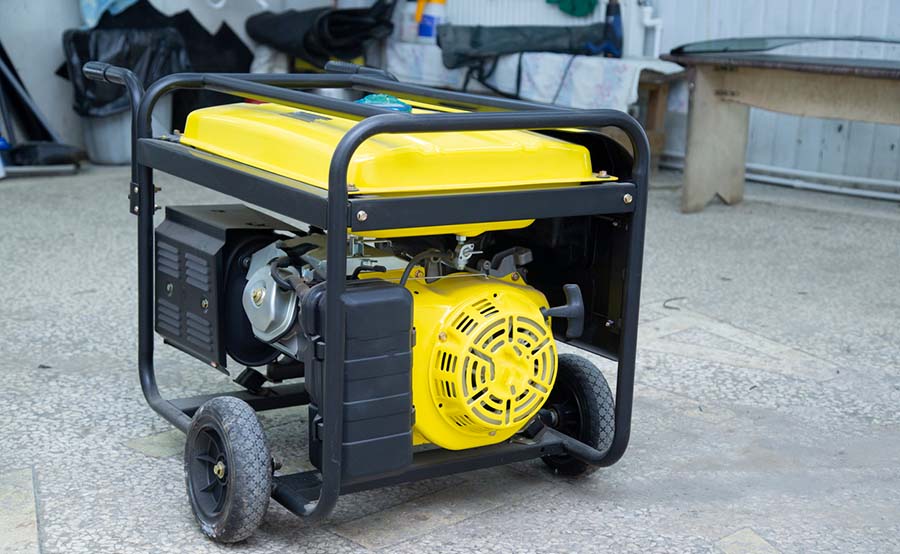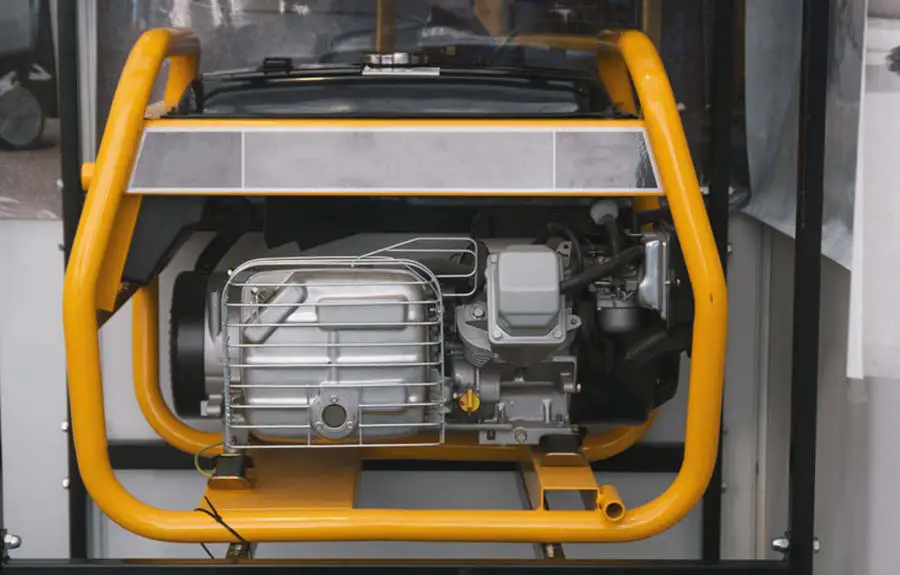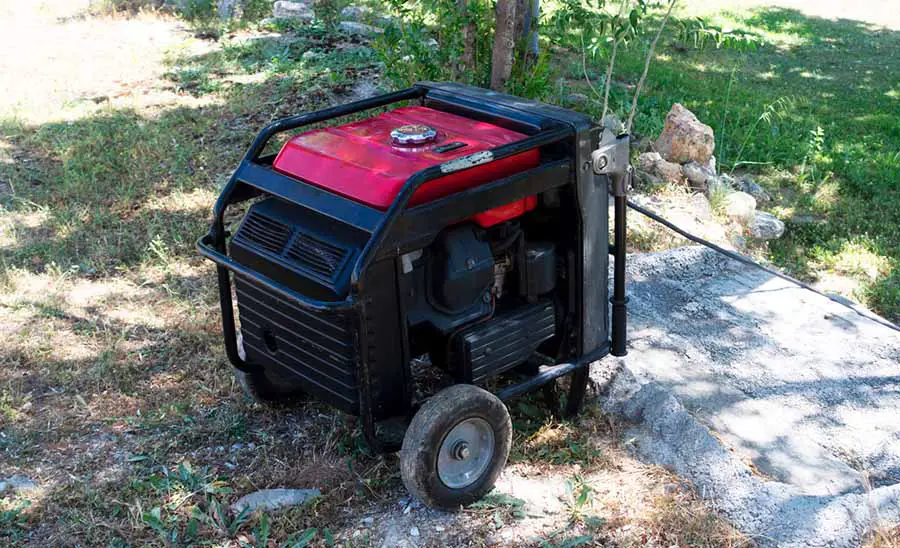
If you want your portable generator to be ready to fire up when you need it, you should think about how to properly store and maintain it during those periods when you are not using it. Having a generator fail due to misuse or improper storage in the middle of a power outage can certainly ruin your day.
Inside a garage, storage unit, shed, or generator enclosure are great places to store a generator when you’re not using it. It is essential to keep your generator in an enclosed, safe, dry space. Make sure to empty the fuel tank or treat any remaining fuel before putting your generator in storage.
Generators are essential equipment in offices and homes. To ensure that your portable generator starts up easily when you most need it after a period of downtime, read on. We’re going to list the places to keep your power source on the trusty side of your ledger.
Best Places to Store Your Generator When Not In Use
Here are four of the best and safest places to store your generator when you’re not using it.
1. Store Your Generator In a Garage
A vehicle you’re is the most popular place to store a generator. As you may imagine, there are some pretty simple reasons for this:
- Your garage will offer your generator maximum protection from the outside elements. Generators do not appreciate being left on their own to deal with rain, snow, or extreme heat. Your motor vehicles have much the same opinion about the elements, which is why you build a garage for them in the first place.
- The temperature of your garage is, usually, very stable. Extreme fluctuations in temperature are never a good idea for the plastic and rubber seals on your unit.
- Generators are not only desirable pieces of equipment (which is, presumably, why you own one), they are also quite expensive pieces of equipment. Leaving your precious power generator in a place where it is likely to tempt someone to rearrange its ownership credentials is not the most wonderful idea. Your garage is as safe a place as any to ensure that your unit remains securely in your hands.
- Your garage is usually attached to your home. As such, when you need your generator, it is a simple matter of opening one of the doors leading into the garage and extracting it. Generators, as emergency power units, are often required at short notice and often with some urgency. Accessibility is key.
The downside to storing your generator in the garage is the risk of fire. Generators also produce potent smelling and potentially harmful gaseous emissions.
2. Store Your Generator In a Storage Unit

Every reason why a garage is an excellent place to store a generator is valid for a storage unit as well, except for a few drawbacks.
On the plus side:
- The storage unit will afford optimal protection from the outside elements.
- In most cases, your storage unit will have a stable and controlled environment, negating the issue of fluctuating temperatures.
- Storage units, due to both the security in place at the facility and the very anonymity of the entrance door, are very secure places to keep your valuable generator safe from theft.
There are some drawbacks to leaving your generator at your local storage facility, however:
- Storage units are not free to use, so it will cost you money every month to rent one out.
- Accessibility, as mentioned, is key. Gaining access to your storage unit is nowhere near as easy as simply unlocking your garage and hauling it out. They often have strict times of opening and, quite often, they are closed at night.
- You will, by law, be required to drain your generator of all flammable liquid. Doing this every time you want to use your generator, whether you are storing for the long term or the short term, will soon become a real chore.
3. Store Your Generator In a Generator Enclosure
If you do not have a garage and still wish to have regular access to your generator, then a rented storage unit is not ideal. If this is the case, then you may want to consider acquiring a purpose-built generator enclosure.
These devices are designed to ensure that your generator can be safely stored outside and will still offer protection from the elements. They have proper soundproofing and ventilation. They also have enough weatherproofing and insulation to withstand harsh winters and hot summers.
Another massive advantage to the generator enclosure is that some allow you to operate the generator while still secure in the enclosure.
Unfortunately, all this comes at a price. A good quality enclosure can run upwards of $2000.
4. Store Your Generator In a Shed
Suppose you do not own a garage, or it is full of motor vehicles and all the other unnecessary detritus that modern families seem to accumulate. Additionally, you do not wish to purchase a generator enclosure. In that case, a well-insulated outdoor shed is a great option.
Some people may prefer not to store such a potentially dangerous machine close to home. Many generators run on potentially explosive fuel, and it is safer to have this combustible substance further from your living areas.
Your shed may not be ideal in the winter months, however. A shed is usually not quite as well insulated from the cold as the average home garage. If you are going to store your generator in your garden shed, try to ensure that it is lined internally with some form of cold weather insulation.
A good recommendation is to purchase an insulated cover for your model as well. As mentioned above, generators do not like cold weather and, if exposed to very low temperatures, their performance may suffer as a consequence.
Preparing Your Generator for Storage

How you prepare your portable generator for storage depends entirely on how long you intend to store your portable generator.
Short-Term Generator Storage
Setting your machine aside for a few days or even a few weeks is a relatively simple process. If you know you will use your generator intermittently throughout the year, all you need to do is find a cool, clean, and well-ventilated area to store it.
Then clean the frame and the exposed parts of the motor, cover it with a cloth or a tarp, and you should be good to go. A few weeks of non-use will not harm the generator or its internal components. The fuel will also be fine for that period, although there may be slight evaporation from the tank.
Long-Term Generator Storage
Storing your reliable power source for a more extended period than just a few weeks, however, takes a little more preparation than merely dusting it off and covering it up with an old cloth.
Always read the instruction manual or the owner’s manual to help you understand how to clean your generator thoroughly. Every different manufacturer will specify recommendations on how to best store their various models. Follow what the manual says. The manufacturer usually knows what they are talking about.
Generally speaking, these are the steps you should consider when storing a generator for a long time:
1. Get Your Generator Serviced
If you do not have the time, energy, or inclination to do it yourself, you should consider taking your unit to the professionals to ensure it is in peak condition. They will give it a tune-up and clean it better than you can, and you can rest easy in the knowledge that, after you have retrieved your machine from storage, it will start the first time and operate at maximum efficiency. Your local lawn mower specialist will be able to perform this service for you.
If, however, you do have the time, energy, and inclination, or, like many of us, do not have the extra cash to spare, then the next three steps come into the equation.
2. The Fuel In the Generator
Clear fuel lines and good, clean fuel are the most critical factor in determining whether your portable generator runs smoothly. A fundamental step in storing your portable generator for any length of time over a few months is to choose one of two actions concerning the fuel remaining in the tank.
Option number one is to empty the tank. The alternative, option two, is to stabilize the fuel.
Adding a stabilizer will extend the life of the fuel and prevent it from clogging and clumping in your carburetor. This is especially important if you have a gas-powered generator and you are fueling with standard E10 gasoline.
A decent ethanol fuel stabilizer will ensure that the fuel in your tank can tolerate the small amounts of water it will inevitably absorb while it is unused. It should also protect your generator’s rubber and plastic parts from reacting to the fuel while in storage.
An additional tip here is to run your generator dry with the fuel line disconnected. This will ensure that no fuel remains in the carburetor or the fuel lines.
3. Thoroughly Clean Your Generator
Disconnect your portable generator from any power sources before you start to clean it. Inspect the entire machine for any fuel or oil leaks and remove any grimy dirt or debris from around the filler caps for the fuel and oil. Scrub the cooling fins or slots, wipe down the engine controls and buttons, and then clean the muffler enclosure, the springs, and the carburetor.
4. Inspect Your Generator for Damage
Before you store it, perform a thorough inspection of all the parts and components. Look carefully for parts that appear to be damaged or are starting to show signs of excessive wear and tear. Worn parts are only likely to deteriorate while in storage.
It is a good idea to inspect the hoses and fuel lines, the switches and buttons, the wheels and the handles, the fuel tank, and the spark arrestor. Replace any worn or damaged parts before putting your generator in storage. You usually need a generator on fairly short notice, so make sure it is ready to go when the time comes.
Once you have considered how long you intend to set your unit aside and take steps to clean it accordingly, you are ready to store your unit safely.
Should You Store Your Generator In Your House?
No, you should typically not store your generator in your house.
However, if circumstances dictate that you have no other option but to store it in your living space, then place it in a seldom-used room or is far away from your main living area. Better yet, if you have a basement, store the generator in there.
As mentioned earlier, generators will also produce powerful smelling and potentially harmful gaseous emissions. To negate this issue, drain your generator of all flammable liquids and oils before storing it in your home. Purchasing a well-fitting cover will also help to neutralize these smells and odors.
Advice from Generator Manufacturers Regarding Storage
This is what the manufacturers of Champion Generators have to say about storing their generators:
“All generators need to be properly stored and maintained during periods of non-use. When you add a properly formulated fuel stabilizer and store your generator in a cool, dry place, gasoline in the fuel tank has a maximum shelf life of up to one year. However, gasoline will clog in the carburetor if it isn’t used or drained within two weeks. Follow along in your owner’s manual to properly store your generator”
And this is what they advise when you need to retrieve your generator from storage:
“If the fuel tank and carburetor were properly emptied of all fuel prior to the generator being stored, Follow along in your owner’s manual to when removing your generator from storage. If your generator has been improperly stored for a long period of time with gasoline in the fuel tank or carburetor, all fuel must be drained and the carburetor must be thoroughly cleaned before you can safely run your generator.”
Final Thoughts
If not used regularly for work or on-site, you usually need a generator in an emergency. With that in mind, it is vital to maintain it properly and store it correctly to provide reliable power when the grid fails or you need power in a remote location
Storing your generator may seem, at first, to be a somewhat complex process, but after following the steps we have described, it will become second nature within a relatively short period.
Following these tips will help prolong the lifespan of your generator and ensure that it properly functions when it comes time for you to use it.

